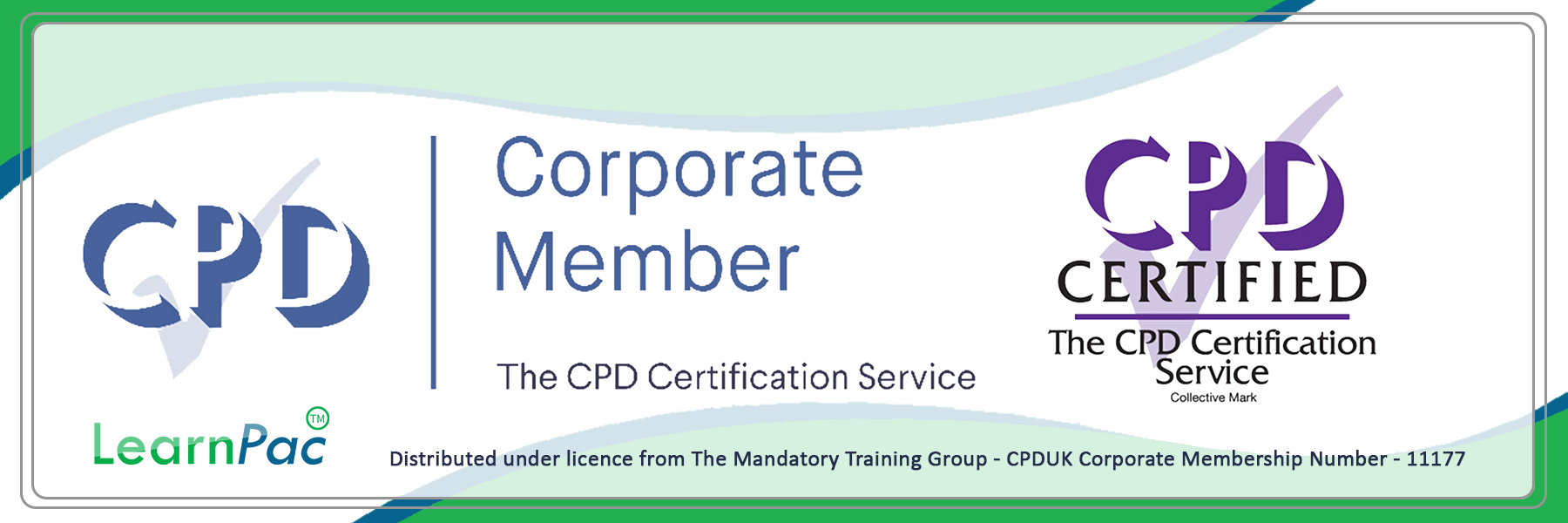GDPR Training - E-Learning Courses - CPDUK Accredited

GDPR Training – E-Learning Courses with Certificates – CPDUK Accredited.
LearnPac Systems is the leading UK provider of accredited statutory and mandatory training courses for all sectors, including health and social care, education, local government, private and charity sectors.
With our GDPR training e-learning courses, learners will understand the different types of malware, types of security breaches and develop effective prevention methods which will increase overall security. They will also understand the basic concepts associated with GDPR and what a company needs to stay secure.
These GDPR training e-learning courses aims to highlight the critical aspects of the General Data Protection Regulations (GDPR) and how they affect health and social care organisations.
Browse our GDPR Training - E-Learning Courses
GDPR Training: Frequently Asked Questions and Answers
GDPR Training – E-Learning Courses with Certificates – CPDUK Accredited – LearnPac Systems UK.
Here at LearnPac Systems, we receive many questions about GDPR. We have provided answers to the most frequently asked questions about GDPR.
Click on the text below to see the answers to the Frequently Ask Questions about GDPR.
First things first. GDPR stands for General Data Protection Regulation. It is a European Union law and replaces the Data Protection Directive, which was not.
LearnPac Systems is the leading UK provider of accredited statutory and mandatory training courses for all sectors, including health and social care, education, local government, private and charity sectors.
Click here for GDPR for Health and Social Care – Online Course – CPD Accredited
The General Data Protection Regulation (GDPR) is a new EU regulation which comes into force on 25 May 2018. Its aim is to improve privacy and give greater control to customers and citizens over their personal information and how it is used.
LearnPac Systems is the leading UK provider of accredited statutory and mandatory training courses for all sectors, including health and social care, education, local government, private and charity sectors.
Click here for Information Governance and Data Security – Online Course – CPD Accredited
GDPR is first of all demanding due to its detailed transparency requirements. GDPR is important because it improves the protection of European data subjects’ rights and clarifies what companies that process personal data must do to safeguard these rights.
LearnPac Systems is the leading UK provider of accredited statutory and mandatory training courses for all sectors, including health and social care, education, local government, private and charity sectors.
Click here for Documentation and Record-Keeping – Online Course – CPD Accredited
At its core, GDPR is a new set of rules designed to give UKc citizens more control over their personal data. It aims to simplify the regulatory environment for business so both citizens and businesses in the EuThe reforms are designed to reflect the world we’re living in now and bring laws and obligations – including those around personal data, privacy and consent – across Europe up to speed for the internet-connected age. European Union can fully benefit from the digital economy.
Fundamentally, almost every aspect of our lives revolves around data. From social media companies to banks, retailers, and governments – almost every service we use involves the collection and analysis of our personal data. Your name, address, credit card number and more all collected, analysed and, perhaps most importantly, stored by organisations.
One of the most tangible requirements of the GDPR is in the definition of what constitutes a proper GDPR cookie consent, meaning, that the consent has to be:
- Informed: Why, how and where is the personal data used? It must be clear for the user, what the consent is given to, and it must be possible to opt-in and opt-out of the various types of cookies.
- Given by means of an affirmative, positive action that cannot be misinterpreted.
- Given prior to the initial processing of the personal data.
- Withdrawable. It must be easy for the user to change his or her mind and withdraw the consent.
- The user has the right to be forgotten. At the user’s request, all of his or her personal data must be properly deleted.
All given consents must be recorded as documentation.
Data breaches inevitably happen. Information gets lost, stolen or otherwise released into the hands of people who were never intended to see it – and those people often have malicious intent.
Under the terms of GDPR, not only do organisations have to ensure that personal data is gathered legally and under strict conditions, but those who collect and manage it are obliged to protect it from misuse and exploitation, as well as to respect the rights of data owners – or face penalties for not doing so.
GDPR applies to any organisation operating within the EU, as well as any organisations outside of the EU which offer goods or services to customers or businesses in the EU. That ultimately means that almost every major corporation in the world needs a GDPR compliance strategy.
The types of data considered personal under the existing legislation include name, address, and photos. GDPR extends the definition of personal data so that something like an IP address can be personal data. It also includes sensitive personal data such as genetic data and biometric data which could be processed to uniquely identify an individual.
Because of the sheer number of data breaches and hacks that occur, the unfortunate reality for many is that some of their data – be it an email address, password, social security number, or confidential health records – has been exposed on the internet.
One of the major changes GDPR brings is providing consumers with a right to know when their data has been hacked. Organisations are required to notify the appropriate national bodies as soon as possible in order to ensure EU citizens can take appropriate measures to prevent their data from being abused.
Consumers are also promised easier access to their own personal data in terms of how it is processed, with organisations required to detail how they use customer information in a clear and understandable way.
The GDPR sets out seven key principles:
- Lawfulness, fairness and transparency
- Purpose limitation
- Data minimisation
- Accuracy
- Storage limitation
- Integrity and confidentiality (security)
- Accountability.
Sensitive personal data include data about racial or ethnic origin, political opinions, religious or philosophical beliefs, trade union membership, a person’s sex life or sexual orientation, health data, genetic data and biometric data. An IP address or a name is considered personal data but NOT sensitive personal data. (see GDPR Article 9.2 (a) and Recitals 51 and 71 for more information).
A data controller is a party that determines the purpose and means of the data processing. Within the context of for example a company or a website and its customers and users, the data controller is the company or website, that processes the data of its customers and users in order to optimise its services or whatever it is the company/website wants to accomplish by means of the data processing.
A data processor is a party which performs the data processing on behalf of the controller. When it comes to websites, data processors typically are tools and integrated third parties such as e.g. Google Analytics, Hotjar, social media buttons etc.
A third party is someone other than the data controller or data processor who, under the direct authority of the controller or processor, is authorized to process personal data.
In the context of a website, third parties typically are the cookie setting agents other than the website itself, and the authorization originates in their being integrated into the website as tools, embedded content or services.
Consent of the person whose data is being processed means freely given, informed and unambiguous indication of his or her wishes by which he or she, by a statement or by clear affirmative action, signifies agreement to the processing of personal data relating to him or her.
A personal data breach means a breach of security leading to the accidental or unlawful destruction, loss, alteration, unauthorised disclosure of, or access to, personal data transmitted, stored or otherwise processed.
Data portability is the right to receive one’s personal data in return from a data controller, in a structured, commonly used and machine-readable format, and have the right to transmit those data to another controller without any hindrance from the former (see Article 20 in the GDPR).
Profiling is the use of personal data to evaluate certain personal aspects relating to a specific person, in particular, to analyse or predict aspects concerning that individual’s performance at work, economic situation, health, personal preferences, interests, reliability, behaviour, location or movements.
Pseudonymisation is to process personal data in such a manner that it can no longer be attributed to a specific individual. To ensure correct pseudonymisation, it is important to take care that eventual additional information that could be used to re-identify the subject of the data, is kept separately and securely stored.
A filing system is any structured set of personal data which is accessible according to specific criteria, whether centralised, decentralised or dispersed on a functional or geographical basis.
The short answer to that question is public concern over privacy. Europe, in general, has long had more stringent rules around how companies use the personal data of its citizens. The GDPR replaces the EU’s Data Protection Directive, which went into effect in 1995. This was well before the internet became the online business hub that it is today. Consequently, the directive is outdated and does not address many ways in which data is stored, collected and transferred today.
The UK government has said this won’t impact GDPR being enforced in the country, and that GDPR will work for the benefit of the UK despite the country ceasing to be an EU member. So Brexit is unlikely to have any impact on an organisation’s GDPR compliance requirements.
GDPR sets out a duty for all organisations to report certain types of data breaches which involve unauthorised access to or loss of personal data to the relevant supervisory authority. In some cases, organisations must also inform individuals affected by the breach.
Organisations are obliged to report any breaches which are likely to result in a risk to the rights and freedoms of individuals and lead to discrimination, damage to reputation, financial loss, loss of confidentiality, or any other economic or social disadvantage.
The breach must be reported to the relevant supervisory body within 72 hours of the organisation first becoming aware of it. Meanwhile, if the breach is serious enough to mean customers or the public must be notified, GDPR legislation says customers must be made responsible without ‘undue delay.’
In the event of a company losing data, be it as a result of a cyberattack, human error or anything else, the company is obliged to deliver a breach notification.
This must include approximate data about the breach, including the categories of information and number of individuals compromised as a result of the incident, and the categories and approximate numbers of personal data records concerned. The latter takes into account how there can be multiple sets of data relating to just a single individual.
Organisations also need to provide a description of the potential consequences of the data breach, such as theft of money, or identity fraud, and a description of the measures that are being taken to deal with the data breach and to counter any negative impacts which might be faced by individuals.
The contact details of the data protection officer, or main point of contact dealing with the breach, will also need to be provided.
We end where we began. The GDPR is undoubtedly a complicated document, but encouragingly, it seems less complex now to the privacy professionals tasked with implementing it than it did last year. Respondents to the EY-IAPP survey have given progressively lower difficulty scores for nearly every GDPR compliance responsibility each year since the survey began in 2017.
The majority of businesses and consumers actually appreciate what the GDPR stands for keeping data safe and giving individuals greater control. It seems likely that its principles will spread globally. While there has been a lag in enforcement over the past year, companies put off GDPR compliance at their own peril. With the right resources and some dedication, all organizations can take the steps necessary steps to protect their user’s data.
The GDPR acts as a means of protecting personal data for EU residents across the globe. This means that any business or organization that processes or stores the data of EU residents are subject to GDPR rules and regulations—regardless of whether the healthcare facility physically operates in European Union countries.
The health sector by its very nature collects masses of personal data to deliver services to patients. But how patient data is managed is about to be radically altered, as the European Union’s General Data Protection Regulation (GDPR) comes into force on 25 May.
The EU GDPR gives individuals more power to access personal information held by healthcare, social care, charity and voluntary organisations. Currently, Subject Access Request (SAR) allows organisations to charge £10 to supply information, but under GDPR access is free of charge.
All organisations handling personal data need to have comprehensive and proportionate arrangements for collecting, storing, and sharing information. The GDPR and Data Protection Act 2018 do not prevent, or limit, the sharing of information for the purposes of keeping children and young people safe.
Personal data are any information which are related to an identified or identifiable natural person. For example, the telephone, credit card or personnel number of a person, account data, number plate, appearance, customer number or address are all personal data.
There are various legal and medical requirements about retention periods for patient data. Standard NHS data retention policy is to keep GP records for at least ten years after death.
GDPR compliance checklist for health and social care. The EU GDPR (General Data Protection Regulation) came into effect on 25 May 2018, extending the rights of individuals regarding the collection and processing of their personal data.
It applies to all companies processing personal data where the data subject resides within the European Union, except when processing takes place for law enforcement purposes. GDPR. GDPR refers to The General Data Protection Regulation.
While we may not think of email as subject to the European Union’s General Data Protection Regulation (GDPR), your mailbox, in fact, contains a trove of personal data. Any organization (companies, charities, even micro-enterprises) that handles the personal information of EU citizens or residents is subject to the GDPR.
General Data Protection Regulation (GDPR) guidance. This guidance from the national GDPR working group and IGA will help the NHS, social care and partner organisations prepare for EU General Data Protection Regulation (GDPR), when it begins in May 2018.
Data Protection Act 1998. It enacted the EU Data Protection Directive 1995’s provisions on the protection, processing and movement of data. Under the DPA 1998, individuals had legal rights to control information about themselves. Most of the Act did not apply to domestic use, for example keeping a personal address book.
This type of training is vital in ensuring the GDPR remit is met. GDPR Awareness Training also creates a feeling of ownership of the needs of GDPR compliance, making it a whole company exercise. This ownership then translates into a better understanding of the issues and reasons for the GDPR and data protection.
The above requirements render most of the cookie banners and notifications used prior to the implementation of the GDPR obsolete. For instance, implied consent and consent given simply by visiting a site is not enough.
LearnPac Systems is the leading UK provider of accredited statutory and mandatory training courses for all sectors, including health and social care, education, local government, private and charity sectors.
On successful completion of each of the GDPR courses modules, you will be able to download, save and/or print a quality assured continuing professional development (CPD) certificate. Our CPD certificates are recognised internationally and can be used to provide evidence for compliance and audit.
The CPD Certification Service (CPDUK) accredits all of our statutory and mandatory training courses as conforming to universally accepted Continuous Professional Development (CPD) guidelines.
LearnPac Systems is distributed under the licence from The Mandatory Training Group – CPDUK Corporate Memebrship Number – 1117.





